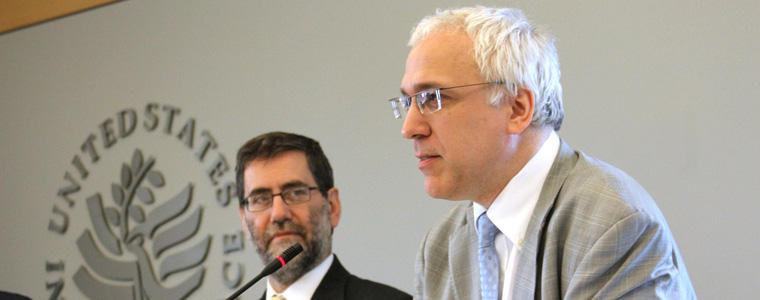Despite pledges to carry out the principle of the responsibility to protect against mass killings, the U.S. and the EU have struggled how to respond to Syria, even as the scale of human loss eclipses that of Libya before the international community intervened. A USIP panel considers how to move forward.

The U.S. and the European Union are uncertain how to address the increasing violence in Syria, even though they’ve made the prevention of mass atrocities a prime foreign policy objective, according to Jan Wouters, a professor of international law and international organizations at the University of Leuven.
The international community and regional organizations have failed to take action that would stem atrocities in Syria, despite a scale of human loss at least five times worse than it was in Libya when international forces intervened, Wouters told an audience at the U.S. Institute of Peace on May 15 during a panel discussion entitled “Transatlantic Atrocity Prevention.”
Wouters spoke alongside Andrea Bartoli, dean of the School of Conflict Analysis and Resolution at George Mason University in Virginia, and Jonas Claes, a program officer in USIP's Center for Conflict Management. The panel compared the approaches of the U.S. and European Union in implementing the doctrine of the responsibility to protect, a concept unanimously endorsed by heads of state at the 2005 United Nations World Summit. The principle holds that nations have a responsibility to protect their own citizens and that the international community must act in cases where the state manifestly fails.
“The duty to prevent and halt genocide and mass atrocities lies first and foremost with the State, but the international community has a role that cannot be blocked by the invocation of sovereignty,” according to the U.N.’s Office of the Special Adviser on the Prevention of Genocide.
The concept of the responsibility to protect is the prime principle through which the prevention of atrocities, including crimes against humanity, war crimes, ethnic cleansing, and genocide, are addressed at the United Nations and in capitals throughout the world, Claes said.
At the USIP discussion, a member of the audience referred to the at least 70,000 people killed so far in Syria and more than 100 million refugees and internally displaced persons who are victims of the conflict in Syria when he asked the panelists, “when does the responsibility to protect begin there?" U.N. General Assembly President Vuk Jeremic told representatives of member states on May 15 before a vote on a resolution that the death toll had exceeded 80,000, an increase of 20,000 from figures U.N. officials gave in January, Reuters news service reported.
Still, the U.N. Security Council has failed to act, Wouters said. The EU's ever-increasing sanctions are limited in their influence, and NATO, the institution he believes could make the most difference, lacks the political will to get involved, he said.
Leaders in both Washington and Brussels see the prevention of mass atrocities as a cost-effective alternative to crisis management or reactive measures. Pressure from advocates and academics also led the Obama administration to issue a presidential study directive that created the Atrocity Prevention Board (APB), chaired by White House special assistant Samantha Power, a former journalist who won a Pulitzer Prize for her book “A Problem From Hell: America and the Age of Genocide.” The book examined the U.S. failure to stop the genocides in Bosnia and Rwanda in the 1990s. Power is on leave and has been replaced in the interim by Steve Pomper. The board contains representatives of all relevant federal agencies.
USIP, the U.S. Holocaust Memorial Museum, and the Brookings Institution also jointly organized a working group on the responsibility to protect. It is co-chaired by former Secretary of State Madeleine Albright and former Ambassador Richard Williamson. The group works to increase understanding of the responsibility and to overcome the political hurdles to taking effective action. Having concluded their formal sessions last year, the group will release its report in July.
Bartoli, the conflict analysis and resolution dean at George Mason, commended the U.S. government and foreign policy specialists for taking on the challenge of coordinating and cementing the idea that nations have a responsibility to protect against atrocities.
"The peacebuilding capacity of the EU mainly resides within the recently created European External Action Service," which focuses on conflict prevention, Claes said. The responsibility to protect is considered a subset of that thematic priority.
Wouters said he supports the idea of developing a European Institute of Peace, a project that Claes wrote about in a USIP Peace Brief. Such an institution could conduct “some sound, fresh, out of the box conceptual thinking.”
The EU's cultural diversity among its 27 members complicates such efforts, Wouters said. Each country maintains a strong sense of national sovereignty, making it increasingly difficult for the organization to institutionalize the concept of the responsibility to protect against atrocities. He asserted that it would take a combined effort from the member states, the European Commission, and others who can provide fresh ideas to advance the concept in the EU.
While the stated commitment of the U.S. and EU to preventing atrocities should theoretically allow for cooperation, Claes argues that the coordination between both governments and non-governmental organizations is "surprisingly low."